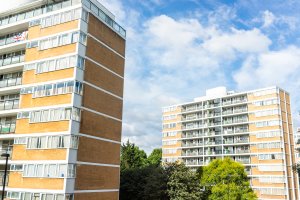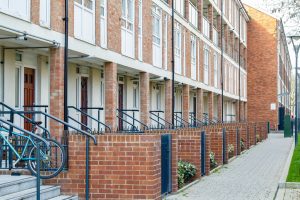What does the national lockdown mean for possession claims?

Table of Contents
The coronavirus pandemic has caused disruption to all elements of life, and possession proceedings are no exception. The number of landlords seeking to recover possession of their property is on the rise, as are the number of renters who have accrued rent arrears. It is now estimated that over 800,000 renters in the private and public sector are behind on their rent[1]. With limited relief being provided by the Government, this figure seems set to rise.
Any existing housing possession claims, whether for rent arrears or any other reason, will need to follow the new rules, and the procedure to bring a possession claim has changed, with no plans for it to be revised before 28 March 2021. So what has changed and what does this mean for Landlords and tenants?
The standard possession procedure, at its most basic requires a landlord to: serve notice on their tenant; upon expiration of the notice, make an application for possession to the court; await notification of a hearing date (unless the claim is heard on the papers); and seek to obtain an order for possession from the court at the hearing. If successful, the landlord must then obtain a warrant for County Court Bailiffs or a Writ for High Court Enforcers to enforce the order, and evict the tenant.
However, as a result of the pandemic there was a national “moratorium”, which stayed all possession proceedings started on or after 27 March 2020 and this lasted until 20 September 2020. The effect of this was that the following could not take place during the period:
- Applications for a possession order or a variation to an existing order;
- Applications to enforce a possession order by an eviction warrant or High Court writ;
- Appeals of possession orders[2].
We are now entering what has been termed “the interim period”. This means that no stayed claim can be listed; relisted, heard; or referred to a judge until one of the parties files and serves a written “reactivation notice” confirming that they wish the case to be listed; relisted; heard or referred to a judge. Only claims brought before 3 August 2020, where no order was made before 27 March 2020 can currently be reactivated.
Any reactivation notice must confirm that the party filing and serving it wishes the case to be listed; relisted; heard or referred and set out the knowledge that party has as to the effect of the pandemic on the Defendant and anyone who resides with them. Any reactivation notice for a claim brought before 3 August 2020 must be filed and served no less than 42 days before the trial date (if one has been fixed) and in any event if no reactivation notice has been filed and served by 4:00pm on 29 January 2021 the claim will be automatically stayed, requiring an application to the court to have the stay lifted.
Where the claim has yet to be listed the court will fix a hearing date after it issues the claim form, but the standard period of eight weeks between the date of issue and the hearing date will not apply. The court has a wide degree of discretion as to when the hearing will be listed.
Any claim that was started on or after 3 August 2020 will not require a reactivation notice. However, the Claimant must still bring to the hearing two copies of a notice that sets out what they knew about the effect of the pandemic on the Defendant and anyone who lives with them, and serve a copy of the notice on the Defendant at least 14 days before the hearing.
Where a claim has been reactivated the Court will list a review hearing, before a substantive hearing is listed. At the review hearing, if settlement cannot be reached and provided the claim is procedurally in order, a substantive hearing will be listed for the first open date after 28 days.
Claims for injunctions; claims against unlawful trespassers; interim possession orders against squatters, and; applications for a case management hearing have not been stayed. Stand-alone actions to recover debt (for instance for rent arrears) have not stayed, but possession proceedings relying on non-payment of rent have been.
The above procedure must be followed in order for a landlord to lawfully recover possession of their property. If this procedure is not followed, then any attempt to evict a tenant may be an unlawful eviction. The tenant would be entitled to seek compensation and reinstatement (re-entry) to the property. A leading national newspaper recently published an article estimating that unlawful evictions were up by a factor of 50%[3].
Unless the new rules and requirements are extended, they will cease to have effect from 28 March 2021 and the procedure will revert to the pre-pandemic rules.
Osbornes Housing Team can offer advice if you are served with possession proceedings or are unlawfully evicted so please contact the team for further advice on 0207 485 8811 or complete an online enquiry form here.
Sources:
Lime Legal
http://limelegal.co.uk/hlwemails/2021/HLW13012021.html
[1] https://www.nrla.org.uk/news/over-eight-hundred-thousand-renters-in-arrears-due-to-covid
[2] Hackney London Borough Council – v – Okoro [2020] EWCA Civ 681
[3] https://www.independent.co.uk/business/illegal-eviction-coronavirus-pandemic-housing-tenants-b487020.html
Related Services:
- Housing & Social Care
- Residential Possession Procedeedings
Contact us today
More from WilliamVIEW ALL
- 21.4.2023
Success in Court of Appeal in child disability...
The Court of Appeal has today handed judgment in the case of Harrington v Secretary of State for Work and...
Read more - 20.1.2023
High Court finds Westminster Council’s Housing Scheme...
Westminster City Council’s housing allocation scheme found to be unlawful The High Court has today handed down judgment finding...
Read more - 14.11.2022
Housing allocation case questions lawfulness of council’s...
Until February 2022, the social housing allocation scheme for the London Borough of Newham allowed people who lived outside the borough...
Read more - 5.8.2022
Legacy benefits uplift: appeal granted by Court of...
On 18 February 2022 the High Court dismissed the case brought by Osbornes on behalf of 4 claimants challenging the governments failure to...
Read more - 5.11.2021
Council overturns unlawful housing policy
Homeless teenager claims victory for more than 1,200 homeless people after forcing council to overturn unlawful housing policy A homeless teenager...
Read more - 3.9.2021
Homeless Teenager takes London Council to High Court
A homeless teenager is taking a London council to the High Court for ‘unlawfully’ banning hundreds of homeless people from...
Read more - 19.8.2021
Housing Disrepair Scandal in South London
Following an investigation by ITV nearly 500 homes in the Eastfields Estate in Mitcham, south London, owned by the housing association...
Read more - 8.4.2021
Council to amend unlawful housing allocation banding process
For the last 8 years Brent Council has stopped the majority of homeless applicants from bidding for rehousing, treating them as ‘...
Read more - 23.12.2020
EU Nationals with Pre-Settled Status entitled to benefits...
Court Judgment means EU Nationals with Pre-Settled Status can access benefits and housing On 18 December 2020 the Court of Appeal handed...
Read more - 22.12.2020
Eviction from home of vulnerable man during lockdown...
Osbornes were instructed just before the lockdown to prevent the eviction of a vulnerable man with capacity issues. He had...
Read more - 22.12.2020
Housing disrepair issues resolved after three years
Osbornes were instructed on behalf of a disabled tenant who had been decanted from her temporary accommodation for some three...
Read more - 22.12.2020
Young mother secures accommodation after illegal evictions during...
Here at Osbornes we have seen illegal evictions on the increase during this global pandemic. Osbornes have been advising many...
Read more - 22.12.2020
Osbornes applying to Supreme Court in housing possession...
In the case of Gateway Housing Association –v- Begum (2) the Court of Appeal recently decided that a tenant must leave...
Read more - 24.11.2020
Is the delay in the Renters Reform Bill...
There have been issues tenants have faced for a long time before pandemic; namely no fault evictions and the other...
Read more - 20.11.2020
Up Up and away to the First Tier...
This year we assisted in written representations for a welfare benefit case in the Upper Tribunal. This is a Housing...
Read more - 20.11.2020
You are homeless because you are in shared...
It is well established that shared facilities are not suitable for families with children as long term accommodation. The client...
Read more - 27.5.2020
I am vulnerable and homeless but the Council...
Homelessness law and procedure can be very complicated. We hope this blog gives you some helpful pointers but it is...
Read more - 4.5.2020
No recourse to public funds in the time...
Anyone working in the field of social welfare law will be familiar with the term “no recourse to public funds”....
Read more - 29.4.2020
Case news: Housing benefit decision addresses issue of...
The background You might be forgiven for thinking that the question of whether a course is full time or part...
Read more - 17.4.2020
Harassment and Unlawful Evictions of Tenants during COVID-19...
At these hugely challenging times, I thought it would be helpful to provide some insight for tenants facing harassment and...
Read more - 31.3.2020
The Coronavirus Act 2020 and Social Care
The Coronavirus Act 2020 (“the Act”) came into law on 25 March 2020 and passed sweeping emergency legislation that is unprecedented in peacetime....
Read more - 30.3.2020
I have a disrepair issue can I withhold...
Withholding rent is not your best course of action. I see the logic in using the non-payment of rent as...
Read more - 27.3.2020
COVID-19 – the impact on landlords of residential properties...
From the 26th March 2020, landlords will have to give their tenants 3 months’ notice if they intend to seek possession compared...
Read more - 26.3.2020
British child living with her mother in the...
In AH v Secretary of State for Work and Pensions [2020] UKUT 53 (AAC), the claimant and her parents are British citizens. ...
Read more
















